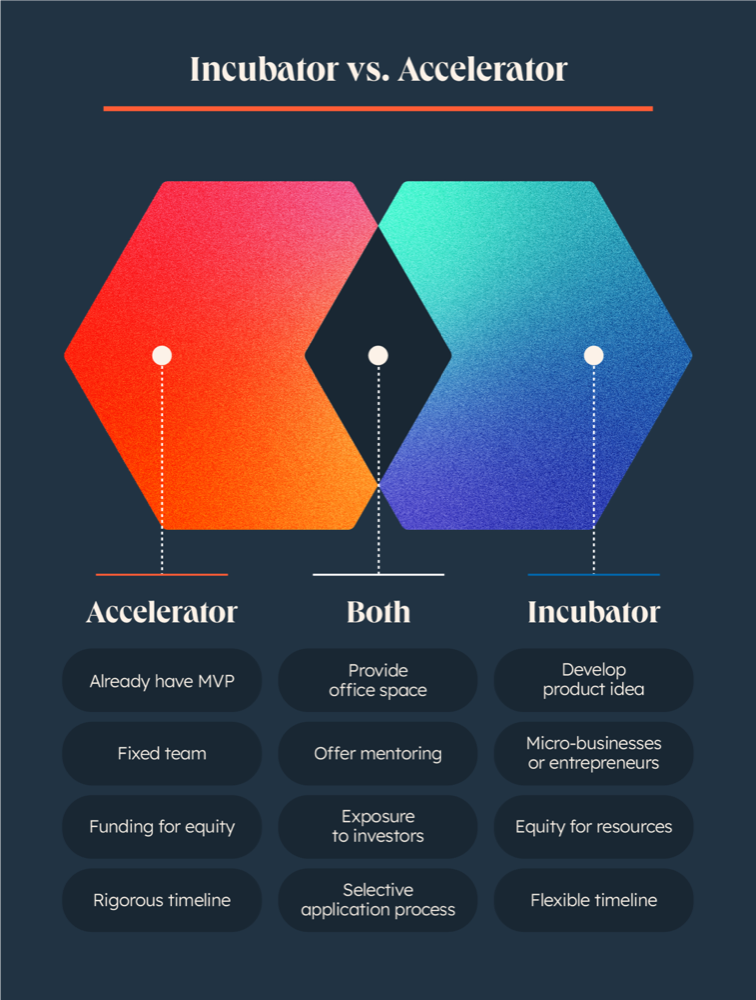Business Incubators and Accelerators: Fueling Startup Success
In today’s fast-paced entrepreneurial landscape, business incubators and accelerators play a vital role in nurturing startups. They provide essential resources, mentorship, and support systems that can make the difference between failure and success. Understanding these concepts is crucial for aspiring entrepreneurs looking to launch their ventures effectively.

Understanding Business Incubators and Accelerators
What is a Business Incubator?
A business incubator is an organization designed to support the growth of early-stage startups by providing them with resources and services to help them become self-sustainable. These programs often focus on startups that require a longer development period to refine their products or services.
Key features of business incubators include:
- Long-term support: Incubators typically engage with startups over several months to a few years, offering ongoing guidance.
- Office space: Many incubators provide physical workspace, enabling startups to collaborate in a supportive environment.
- Networking opportunities: Incubators foster connections with other startups, mentors, and industry experts.
- Training programs: Startups receive educational workshops covering various aspects of business management.
What is a Business Accelerator?
A business accelerator is designed to speed up the growth and development of existing startups. These programs usually last for a shorter duration—typically three to six months—and are aimed at rapidly scaling businesses that have a viable product or service.
Key characteristics of business accelerators include:
- Mentorship: Accelerators often provide access to experienced mentors who can offer valuable insights and advice.
- Investment opportunities: Many accelerators offer seed funding in exchange for equity, helping startups secure the capital needed for growth.
- Cohort-based structure: Startups are usually accepted in cohorts, fostering collaboration and networking among participants.
- Focus on scalability: Accelerators emphasize rapid growth and market entry, pushing startups to achieve significant milestones during the program.

Key Differences Between Incubators and Accelerators
While both incubators and accelerators aim to help startups, their approaches and structures differ significantly. Here are some key differences:
Duration of Support
- Incubators: Provide long-term support over several months or even years, allowing startups to develop their ideas and products thoroughly.
- Accelerators: Offer short-term, intensive programs focused on rapid growth and market readiness.
Funding Opportunities
- Incubators: Generally do not provide direct funding; instead, they focus on offering resources and guidance.
- Accelerators: Often provide seed funding in exchange for equity, giving startups the financial boost they need to scale quickly.
Focus Areas and Resources
- Incubators: Concentrate on nurturing startups in their early stages, emphasizing idea validation and business model development.
- Accelerators: Focus on helping startups refine their products, scale their operations, and prepare for market entry.

Benefits of Joining an Incubator or Accelerator
Participating in a business incubator or accelerator can provide numerous advantages for startups:
Networking Opportunities
Connecting with other entrepreneurs, mentors, and industry professionals is invaluable. Incubators and accelerators create environments that encourage networking, leading to potential partnerships, collaborations, and even customer acquisition.
Access to Mentorship
Startups benefit from the knowledge and experience of seasoned entrepreneurs and industry experts. Mentorship can guide startups in making informed decisions, avoiding common pitfalls, and refining their business strategies.
Financial Support and Resources
While incubators may not provide direct funding, they often help startups access grants, loans, and investors. Accelerators, on the other hand, typically offer seed funding that can be crucial for scaling operations.
Skills Development
Both incubators and accelerators offer workshops, training sessions, and resources that help entrepreneurs develop essential skills, from marketing and finance to leadership and negotiation.
How to Choose the Right Incubator or Accelerator
Choosing the right program can significantly impact a startup’s trajectory. Here are some tips to help entrepreneurs make an informed decision:
- Evaluate Your Startup Needs: Understand your business stage and requirements. Incubators may be better suited for early-stage startups, while accelerators might be more beneficial for those looking to scale.
- Research Available Programs: Look for programs that align with your industry and goals. Consider factors like location, reputation, and success stories of past participants.
- Understand the Application Process: Each incubator and accelerator has its own application criteria and process. Familiarize yourself with these requirements to increase your chances of acceptance.

Conclusion
Business incubators and accelerators are powerful resources for entrepreneurs, offering guidance, funding, and networking opportunities. Understanding the distinctions between these programs can help startups select the right path to nurture their ideas and foster growth. By leveraging the support available through these organizations, entrepreneurs can significantly increase their chances of success in the competitive business landscape.
Stay tuned for the second half of the article, where we will delve deeper into success stories of startups that have thrived in these programs and address some frequently asked questions!
Success Stories of Startups in Incubators and Accelerators
Many startups have achieved remarkable success through the support of business incubators and accelerators. Here are a few notable examples:
1. Airbnb
Airbnb, one of the most successful hospitality platforms, initially went through the Y Combinator accelerator. The guidance and mentorship provided by the program helped Airbnb refine its business model and scale rapidly.
2. Dropbox
Another success story from Y Combinator, Dropbox used its time in the accelerator to validate its product, improve user engagement, and ultimately secure significant funding. Today, Dropbox is a billion-dollar company, transforming the way people store and share files.
3. Redbeacon
This home services marketplace started in an incubator program that helped it develop its business model and marketing strategies. Redbeacon later secured funding from various investors and became a leader in its niche.
These examples illustrate the transformative power of incubators and accelerators in launching successful businesses. By providing crucial resources and mentorship, these programs can help startups turn innovative ideas into thriving companies.

FAQs about Business Incubators and Accelerators
What is the primary goal of a business incubator?
The primary goal of a business incubator is to support early-stage startups in developing their business concepts, products, and services. Incubators provide resources, mentorship, and a collaborative environment to help startups grow sustainably.
How do accelerators differ from incubators?
Accelerators focus on scaling existing businesses over a shorter duration, typically offering seed funding and mentorship to facilitate rapid growth. In contrast, incubators support startups in their early stages, often without providing direct funding.
Can a startup apply to both an incubator and an accelerator?
Yes, a startup can apply to both programs, but it’s crucial to understand the timing and objectives of each. Participating in an incubator first may help refine the business idea, making it more suitable for an accelerator later on.
What are the costs associated with joining an incubator or accelerator?
Costs can vary widely. Some programs are free, while others may take equity in exchange for services or require a nominal fee. It’s essential for startups to review the terms of participation carefully.
What should startups look for when choosing a program?
Startups should consider factors such as the program’s focus, success rate, mentorship quality, funding opportunities, and alumni network when selecting an incubator or accelerator. Finding a program that aligns with their specific needs can significantly impact their success.
Conclusion
Business incubators and accelerators play a critical role in the entrepreneurial ecosystem, providing invaluable resources and support to startups. By understanding the differences between these programs and leveraging their unique offerings, entrepreneurs can significantly enhance their chances of success.
Whether you are just starting or looking to scale, joining an incubator or accelerator can provide the necessary tools and connections to turn your vision into reality. As the startup landscape continues to evolve, these organizations remain at the forefront, helping innovative ideas thrive and shaping the future of business.

Explore More:
– To learn more about different funding options available for startups, check out our guide on Startup Financing.
– For a deeper dive into the startup ecosystem, visit Entrepreneurship Resources.
By utilizing the right resources and support systems, entrepreneurs can navigate the complexities of launching a startup and drive their businesses toward success.

